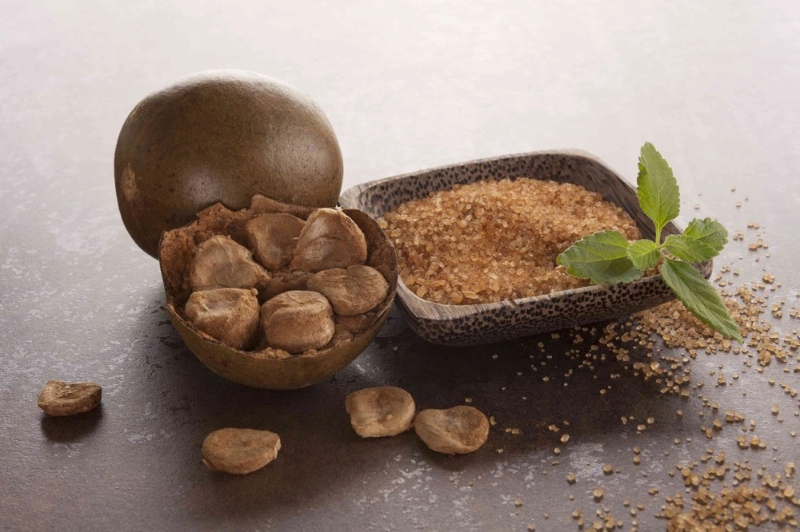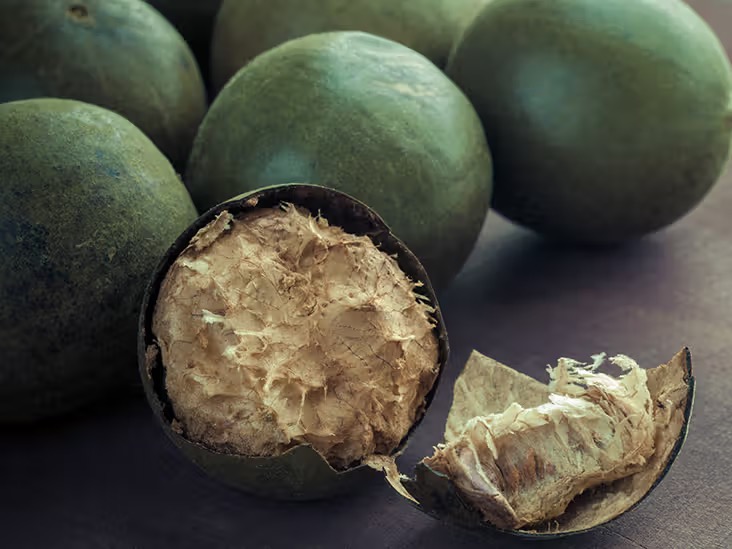







Content Menu
● What is Monk Fruit Sweetener?
● Health Benefits of Monk Fruit Sweetener
>> Zero Calories and Blood Sugar Friendly
>> Anti-Inflammatory and Antioxidant Effects
>> Supports Weight Management and Metabolic Health
>> Does Not Promote Tooth Decay
● Is Monk Fruit Sweetener Safe?
>> Regulatory Approvals and Safety Profile
>> Suitability for Various Populations
● How to Use Monk Fruit Sweetener
● Monk Fruit vs. Other Sweeteners
● Scientific Research on Monk Fruit
● Potential Side Effects and Precautions
● FAQ About Monk Fruit Sweetener
>> 1. Is Monk Fruit Sweetener safe for people with diabetes?
>> 2. Can children consume monk fruit sweetener?
>> 3. Are there any side effects from monk fruit sweetener?
>> 4. Does monk fruit sweetener contribute to tooth decay?
>> 5. How much monk fruit sweetener can I consume daily?
Monk Fruit, known scientifically as Siraitia grosvenorii and also called Luo Han Guo, is a natural sweetener derived from the monk fruit, a small green melon native to southern China. Over recent years, it has gained prominence as a popular sugar alternative for those seeking a healthier, lower-calorie option without sacrificing sweetness. But a common question remains: Is Monk Fruit Sweetener safe for everyday consumption? This comprehensive article explores the safety, health benefits, potential risks, and usage tips for monk fruit sweetener, especially focusing on its suitability for people with diabetes, children, and those interested in natural sweeteners.

Monk fruit sweetener is made by extracting juice from the monk fruit and drying it into a concentrated powder or liquid form. It is intensely sweet—between 150 to 250 times sweeter than regular sugar—due to natural compounds called mogrosides. These mogrosides not only provide sweetness but also possess antioxidant and anti-inflammatory properties.
During processing, the sugars naturally present in the fruit, such as glucose and fructose, are removed, leaving behind only the mogrosides. This explains why monk fruit sweetener contains no calories or carbohydrates that impact blood sugar levels. In some commercial products, monk fruit extract may be blended with other ingredients like erythritol or inulin to balance sweetness intensity or aid texture, but pure monk fruit sweetener usually contains only the mogroside extract.
One of the key benefits of monk fruit sweetener is that it contains zero calories and has no carbohydrates impacting blood glucose levels. This makes it an excellent sugar substitute for people with diabetes or those focusing on weight management. Because it does not spike blood sugar, it helps improve glycemic control and supports better metabolic health.
Clinical studies have demonstrated that monk fruit extract consumption does not significantly affect blood sugar levels. In a crossover study, monk fruit extract showed no impact on blood glucose levels compared to sucrose, which caused a substantial increase shortly after ingestion. This evidence supports monk fruit's safety as a natural, non-caloric sweetening option that aligns with dietary preferences for managing diabetes.
Mogrosides, the active sweet compounds in monk fruit, have been shown to have anti-inflammatory properties, which may help reduce inflammation in the body—an underlying factor in many chronic diseases. They also act as antioxidants, protecting cells from oxidative damage that contributes to aging and conditions such as cardiovascular disease.
Animal studies have revealed promising effects of monk fruit extract in preventing weight gain, improving insulin sensitivity, and reducing fat accumulation. Mogrosides can inhibit pancreatic lipase, an enzyme essential for fat digestion, which may help reduce dietary fat absorption and support weight loss.
In addition, monk fruit sweetener may help regulate appetite by influencing satiety hormones, reducing the tendency to overeat sweet foods. Although more direct human studies are needed, randomized controlled trials comparing monk fruit to other sweeteners have shown it to be effective in reducing energy intake and supporting modest weight loss.
Unlike sugar, monk fruit sweetener does not contribute to tooth decay or cavities because it is non-cariogenic. This tooth-friendly property makes it a preferable sweetener for dental health compared to traditional sugar and some artificial sweeteners.

Monk fruit sweetener has received Generally Recognized As Safe (GRAS) status from the U.S. Food and Drug Administration (FDA), confirming its safety for use in food and beverages. It is also approved for use in many other countries, including China, Japan, Canada, Australia, and New Zealand.
The safety of monk fruit sweetener has been extensively studied. Toxicity data indicate that it is non-toxic and generally well tolerated with no significant adverse effects. However, as with all food additives, moderation is advised. Some concerns have been raised regarding products mixed with erythritol or other sugar alcohols, which in sensitive individuals may cause digestive discomfort such as bloating or gas.
- Children: Current evidence supports that monk fruit sweetener is safe for children. Although specific pediatric studies are limited, no adverse effects have been documented.
- Pregnant and Breastfeeding People: There is no evidence of harm during pregnancy or lactation, but moderate consumption is recommended as a general precaution.
- People with Diabetes: Monk fruit sweetener is widely viewed as an ideal sugar substitute due to its negligible effect on blood glucose levels and insulin response.
Monk fruit sweetener can replace sugar in most culinary applications including beverages, baking, cooking, and desserts. It dissolves well in liquids and is stable under heat, making it suitable for baking and frying. Since it is much sweeter than sugar, only a small amount is needed, typically one-tenth to one-third the amount of sugar called for in recipes depending on the product formulation.
| Feature | Monk Fruit Sweetener | Stevia | Artificial Sweeteners (Aspartame, Sucralose) |
|---|---|---|---|
| Caloric Content | Zero | Zero | Zero |
| Blood Sugar Impact | None | None | None |
| Natural Source | Monk fruit | Stevia plant leaves | Synthetic |
| Taste | Sweet with subtle fruity notes | Sweet with slight bitter aftertaste | Sweet, may have chemical aftertaste |
| Health Concerns | Generally safe; watch additives | Safe; possible bitterness | Controversial, long-term effects debated |
Scientific research has increasingly validated the health benefits and safety of monk fruit sweetener. Studies in rats have shown that mogroside V, the main sweetener compound, can improve fasting glucose and insulin sensitivity. Animal models suggest it can alleviate symptoms of type 2 diabetes by improving liver function, reducing oxidative stress, and balancing lipid profiles.
Multiple studies indicate that monk fruit extract supports metabolic health by reducing hyperglycemia, hyperlipidemia, and inflammation. It may also protect pancreatic cells and help regulate immune function in diabetic conditions. While these findings are promising, further clinical trials in humans are needed to confirm long-term benefits and optimal consumption levels.
Animal and human research also indicate that monk fruit sweetener may help reduce appetite and overall calorie intake, which can support weight management efforts.
Pure monk fruit sweetener rarely causes side effects or allergies. However, consumers should be aware that some commercial monk fruit sweeteners may contain additives like erythritol which can cause gastrointestinal discomfort in sensitive people. Additionally, some individuals might experience mild allergic reactions, though these are uncommon.
Moderation is advised, and consumers should carefully read product labels to avoid unwanted additives. Choosing products with mostly pure monk fruit extract ensures the safest and most natural experience.
Monk fruit sweetener is a safe, natural, and effective alternative to sugar that offers numerous health benefits with minimal risks. Its zero-calorie profile and negligible impact on blood glucose make it especially beneficial for people with diabetes and those aiming to manage their weight. The antioxidant and anti-inflammatory properties of mogrosides further add to its health-promoting effects. Backed by regulatory approvals and growing scientific research, monk fruit sweetener is a reliable choice for individuals seeking healthier sweetening solutions in their diet.
When choosing monk fruit products, opting for pure extracts without erythritol or other sugar alcohols is recommended to minimize potential digestive discomfort. Used in moderation, monk fruit sweetener can be seamlessly integrated into daily meals and beverages, providing a sweet taste without the drawbacks of sugar.

Yes, monk fruit sweetener does not raise blood sugar levels and is considered safe for people with diabetes. Its zero-calorie, non-glycemic nature helps in managing blood glucose effectively.
Yes, current research and regulatory agencies support the safety of monk fruit sweetener for children, though moderation is advised.
Pure monk fruit sweetener rarely causes side effects. However, products with additives like erythritol may lead to digestive discomfort in sensitive individuals.
No, monk fruit sweetener is non-cariogenic and does not promote cavities or tooth decay, unlike regular sugar.
No specific acceptable daily intake has been established due to its safety profile, but like all sweeteners, moderate consumption is recommended.
[1](https://www.foodandnutritionjournal.org/volume13number1/the-battle-of-natural-sweeteners-a-comprehensive-guide-to-monk-fruit-and-stevia/)
[2](https://www.healthline.com/nutrition/monk-fruit-sweetener)
[3](https://pmc.ncbi.nlm.nih.gov/articles/PMC10495570/)
[4](https://pmc.ncbi.nlm.nih.gov/articles/PMC7008860/)
[5](https://www.sciencedirect.com/science/article/abs/pii/S0308814624009269)
[6](https://www.frontiersin.org/journals/nutrition/articles/10.3389/fnut.2022.887992/full)
[7](https://www.naturalhealthresearch.org/systematic-review-of-the-effectiveness-of-monk-fruit-extract/)
